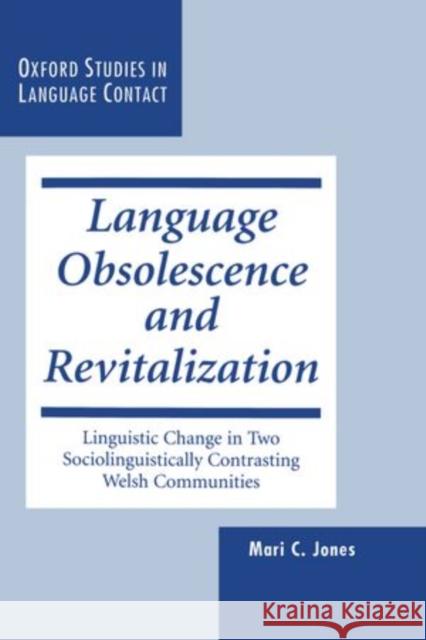Language Obsolescence and Revitalization » książka
Language Obsolescence and Revitalization
ISBN-13: 9780198237112 / Angielski / Twarda / 1998 / 464 str.
The territorial contraction and speaker-reduction undergone by the Welsh language during the past few centuries has resulted in its categorization by many linguists as an obsolescent language. This study illustrates that, although it is undeniably showing some signs of decline, Welsh stands in marked contrast to many previously documented cases of language death. Against this backdrop of contraction a steady revitalization is taking place. Based upon extensive fieldwork in two sociolinguistically contrasting communities, this book is the first to examine the position and nature of contemporary Welsh with reference to both obsolescence-related developments and changes under way in the dialects. Jones focuses on immersion education, long heralded as the saviour of the language and, by examining the variety of Welsh being produced by immersion pupils, seeks to determine whether this claim is justified, or whether such pupils are in fact 'speaking immersion'. As well as discussing the recent linguistic change shown by contemporary Welsh within the language death framework, the author examines the ways in which the language has been standardized and their repercussions for language maintenance. By way of comparison these tensions and implications are also explored with reference to the other varieties of P-Celtic, namely Breton and Cornish. Series Information: Oxford Studies in Language Contact Series Editor: Professor Suzanne Romaine, Merton College, Oxford Series ISBN: 0-19-961466-0 Series Description: Most of the world's speech communities are multilingual, and contact between languages is thus an important force in the everyday lives of most people. Studies of language contact should therefore form an integral part of work in theoretical, social, and historical linguistics. This series makes available a collection of research monographs which present case studies of language contact around the world. As well as providing an indispensable source of data for the serious researcher, it contributes significantly to theoretical developments in the field.
Mari C. Jones's book is the first to examine developments in contemporary Welsh with reference to both language death and standardization. She bases her study on extensive fieldwork in two sociolinguistically contrasting communities and examines agents of revitalization, such as immersion schools and the media, and the effect they are having on Welsh. She explores and discusses the position of Breton and Cornish by way of comparison.











